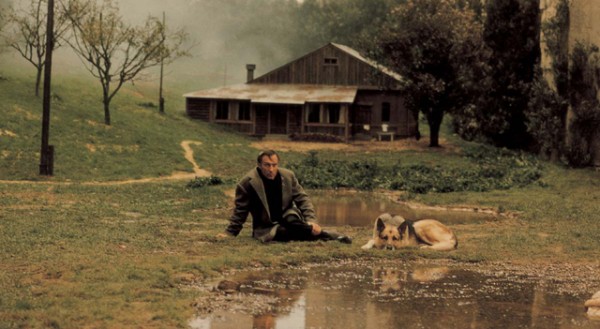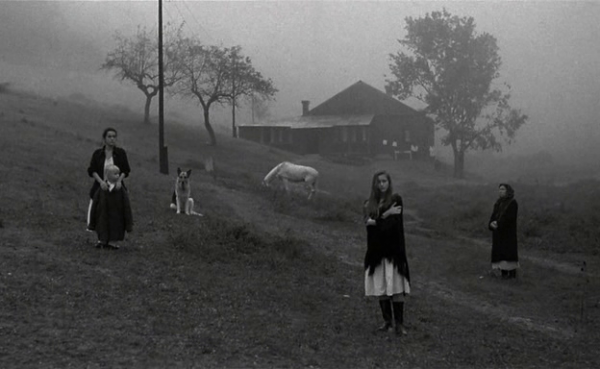NOSTALGHIA (Andrei Tarkovsky, 1983)
Museum of Arts & Design
2 Columbus Circle at 58th St. & Eighth Ave.
Friday, August 14, $10, 7:00
Series continues Friday nights through August 28
212-299-7777
madmuseum.org
 In a 1984 interview with Gideon Bachmann for a special issue of the Swedish film journal Chaplin, Soviet auteur Andrei Tarkovsky said, “I don’t believe that there exists any form of art film that can be understood by everyone. . . . It is not essential for me to be understood by everyone.” Tarkovsky was referring specifically to his latest work, the 1983 poetic masterpiece Nostalghia, although he could have been referring to almost any of his seven feature-length films. Nostalghia is a gorgeously told tale of loneliness, alienation, faith, devotion, and the search for home and family, the first film that Tarkovsky made outside of Russia, in Italy. It’s also about light and dark, as Tarkovsky and cinematographer Giuseppe Lanci explore chiaroscuro effects, often incorporating candles to create mesmerizing glows and elongated shadows while alternating between color, sepia, and black-and-white. Written by Tarkovsky and Tonino Guerra, who also collaborated with Michelangelo Antonioni, Federico Fellini, the Taviani brothers, and many others, the film opens in a vast, dark, foggy landscape, where married poet Andrei Gorchakov (Oleg Yanovsky, with strange white patches in his black hair), who is in Italy researching a book on eighteenth-century Russian composer Pavel Sosnovsky, and Eugenia, his Italian translator (Domiziana Giordano), have driven to a remote church to look at a fresco of the Madonna of Childbirth. Inside the church, Tarkovsky and Lanci establish one of their key visual motifs for the film, long, slow shots that pan across vertical elements — columns here, and trees and poles later, with characters showing up in one part of the shot and then another, impossibly, without the camera cutting away. Eugenia, who has flowing blond hair, is reading a book of poems by Arseni Tarkovsky, the director’s father, in Italian, but Gorchakov tells her to throw it away. “Poetry is untranslatable, like the whole of art,” he says, a sly reference to the director’s first Italian film.
In a 1984 interview with Gideon Bachmann for a special issue of the Swedish film journal Chaplin, Soviet auteur Andrei Tarkovsky said, “I don’t believe that there exists any form of art film that can be understood by everyone. . . . It is not essential for me to be understood by everyone.” Tarkovsky was referring specifically to his latest work, the 1983 poetic masterpiece Nostalghia, although he could have been referring to almost any of his seven feature-length films. Nostalghia is a gorgeously told tale of loneliness, alienation, faith, devotion, and the search for home and family, the first film that Tarkovsky made outside of Russia, in Italy. It’s also about light and dark, as Tarkovsky and cinematographer Giuseppe Lanci explore chiaroscuro effects, often incorporating candles to create mesmerizing glows and elongated shadows while alternating between color, sepia, and black-and-white. Written by Tarkovsky and Tonino Guerra, who also collaborated with Michelangelo Antonioni, Federico Fellini, the Taviani brothers, and many others, the film opens in a vast, dark, foggy landscape, where married poet Andrei Gorchakov (Oleg Yanovsky, with strange white patches in his black hair), who is in Italy researching a book on eighteenth-century Russian composer Pavel Sosnovsky, and Eugenia, his Italian translator (Domiziana Giordano), have driven to a remote church to look at a fresco of the Madonna of Childbirth. Inside the church, Tarkovsky and Lanci establish one of their key visual motifs for the film, long, slow shots that pan across vertical elements — columns here, and trees and poles later, with characters showing up in one part of the shot and then another, impossibly, without the camera cutting away. Eugenia, who has flowing blond hair, is reading a book of poems by Arseni Tarkovsky, the director’s father, in Italian, but Gorchakov tells her to throw it away. “Poetry is untranslatable, like the whole of art,” he says, a sly reference to the director’s first Italian film.

Russian poet Andrei Gorchakov (Oleg Yanovsky) gets homesick and tries to save the world in Andrei Tarkovsky’s NOSTALGHIA
At ancient baths where people believe they can attain immortality, Gorchakov meets up with a fanatic named Domenico (Bergman stalwart Erland Josephson) who fears that the end of civilization is coming. “Everyone must be saved, the whole world,” Domenico tells Gorchakov, explaining that he must walk across the steaming water of St. Catherine’s pool with a lighted candle. Dreams and memories mingle with the past and the present as birds fly out of a religious statue, Gorchakov sees the reflection of a younger Domenico in a wardrobe left in the street, a white feather floats slowly to the ground, Domenico stands atop a weathered statue of Marcus Aurelius and demands societal change, and Gorchakov wades through a flooded abandoned building where a young girl appears seemingly out of nowhere. Mirrors and doorways offer limitless possibilities as rain falls and puddles form, both inside and outside. The architecture seems to be crumbling all around Gorchakov as he tries to make sense of life and death, art and poetry. It’s heady stuff, and absolutely gorgeous. In a 1983 interview with Italian journalist Natalia Aspesi in Cannes, Tarkovsky said, “Nostalghia is an extremely important film for me. It is a film in which I have managed to express myself fully. I must say that it has confirmed for me that cinema is a truly great art form, capable of representing faithfully even the most imperceptible movements of the human soul.” Tarkovsky’s glorious work does indeed confirm that cinema is a truly great art form that can get right at the human soul. Nostalghia is screening August 14 at 7:00 as part of the Museum of Arts & Design series “Andrei Tarkovsky, Sculpting in Time,” which runs Friday nights through August 28 and includes all seven of Tarkovsky’s full-length films (Solaris, Stalker, Ivan’s Childhood, Andrei Rublev, The Mirror, Nostalghia, The Sacrifice) before concluding with the behind-the-scenes documentary Directed by Andrei Tarkovsky.
